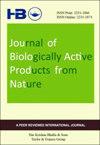Procyanidin Dimer from the Stem Bark of Moringa oleifera (Lam.) Attenuates Insulin Resistance in Rats
IF 1
Q4 CHEMISTRY, MEDICINAL
Journal of Biologically Active Products from Nature
Pub Date : 2023-11-08
DOI:10.1080/22311866.2023.2277897
引用次数: 0
Abstract
AbstractAlcoholic extract and its ethyl acetate fraction of Moringa oleifera (Lam.) (MO), (Moringaceae) bark are experimentally claimed to possess insulin-sensitizing potentials. The present study aimed to isolate and characterize the phytochemical(s) responsible for insulin sensitization in dexamethasone-induced acute and chronic rat models for insulin resistance (IR). The reported ethyl acetate fraction from the alcoholic extract of the bark of MO was prepared and subjected to bioactivity-guided sub-fractionation and isolation of phytochemicals. A component responsible for improving insulin sensitivity in rat models for IR was isolated and reported for the first time from the bark of MO and its structure was characterized as a procyanidin dimer type of polyphenol by spectroscopic techniques.Keywords: DexamethasoneInsulin resistanceMoringa oleiferaOral glucose tolerance testProcyanidin辣木茎皮原花青素二聚体的研究减轻大鼠胰岛素抵抗
辣木(Moringaceae)树皮乙醇提取物及其乙酸乙酯组分具有胰岛素增敏潜能。本研究旨在分离和表征地塞米松诱导的急性和慢性胰岛素抵抗(IR)大鼠模型中负责胰岛素敏化的植物化学物质。采用生物活性导向亚分馏和植物化学成分分离的方法,制备了黄皮醇提物的乙酸乙酯组分。本文首次从MO树皮中分离并报道了一种改善IR大鼠模型胰岛素敏感性的成分,并通过光谱技术鉴定其结构为原花青素二聚体型多酚。关键词:地塞米松胰岛素抵抗辣木油叶口服糖耐量试验原花青素
本文章由计算机程序翻译,如有差异,请以英文原文为准。
求助全文
约1分钟内获得全文
求助全文
来源期刊

Journal of Biologically Active Products from Nature
Agricultural and Biological Sciences-Agricultural and Biological Sciences (miscellaneous)
CiteScore
2.10
自引率
0.00%
发文量
21
 求助内容:
求助内容: 应助结果提醒方式:
应助结果提醒方式:


